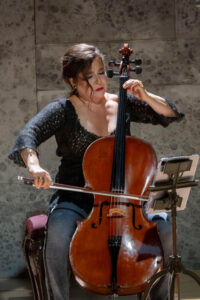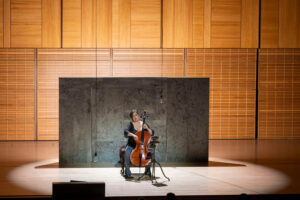
Fragments 3: Alisa Weilerstein at Zankel Hall
May 20th, 2025
Published in Sequenza 21
By Christian Carey
NEW YORK – Alisa Weilerstein is a supremely gifted cellist, and it is hard to imagine being anything less than riveted by her playing. At Zankel Hall last Tuesday, she made decisions for her Fragments project that seemed to be needlessly distracting.
There are six Fragments programs all told, each based on one of the Bach Suites, joined by new pieces commissioned for the project. Fragments 3 featured the third cello suite alongside pieces by Joseph Hallman, Thomas Larcher, Jeffrey Mumford, and Carlos Simon. A design team helped to bring Weilerstein’s concept to life. The set, by Seth Reiser was elegantly simple, a multi-sided screen behind Weilerstein, and costume designer Molly Irelan did a fine job creating a chic yet downtown look for the cellist. The effective lighting, also by Reiser, included various spotlights as well as a moving magic lamp that accompanied moments of intensity. Director Elkanah Pulitzer did not seem to overtly interfere with Weilerstein’s usual performing demeanor. Perhaps ordering and pacing were part of her remit.
The fragmenting of the pieces themselves is where things got challenging for listeners. Instead of presenting each of them in toto, individual movements of all of the pieces, Bach included, were excerpted out of order. In addition, audience members weren’t given a listing of the ordering of these sections, having to wait until after the concert to download a program, using a QR code found in the booklet. In remarks that were printed for consumption beforehand, Weilerstein exhorted the audience to “just listen.” This, by the way, is every reviewer’s nightmare – playing “name that tune” with pieces that you have never yet heard.
It is laudable that so many new works for solo cello have come from this project. However, one feels for the composers, who, instead of being given a bow, were represented by the fragmenting of their pieces into a mix without metadata. It can be said with confidence that all four of the commissioned composers know cello writing authoritatively, including a catalog of extended techniques that featured Weilerstein’s adventurous streak and admirable facility to excellent advantage. Indeed, Simon and Hallmark seemed to invigorate their writing with extra doses of well-integrated 21st century virtuosity.
It was a bit disorienting to hear the Allemande, the second movement of Bach’s suite, appear as the penultimate fragment. Out of order though its movements may have been, the performance of the Bach suite was engaging, played with consummate care and thoughtful phrasing. Most of the program relied on the juxtaposition of old and new music. Only Mumford, with a few ostinatos in an otherwise dazzlingly modernist endeavor, provided a hat tip to Bach. Weilerstein finished the recital with the third movement of Thomas Larcher’s now here, which culminated with a rocket-fueled flourish, dazzling lamplight included.

In the bygone times of analog mixtapes, curation seemed a prerequisite. Playlisting mixes has now become the way that many people usually listen on digital platforms, often passively and without worrying about the aforementioned metadata. When it comes to music consumption, an encroaching facelessness of content seems to be what’s trending. Revising the recital is a welcome endeavor, and annotating program booklets needn’t be an ossified affair. When engaged, just listening is fine, and may be preferable to constantly rifling through the program notes instead of fully attending to the performance. Perhaps supertitles briefly listing who is being played could be a compromise, a mix without undue preconceptual baggage.
All six installations of Fragments will be presented this week at the Spoleto Festival over four nights: May 26, 28, 29, and 31. Bring your cell phone and click on those QR codes as soon as the applause concludes.
-Christian Carey

